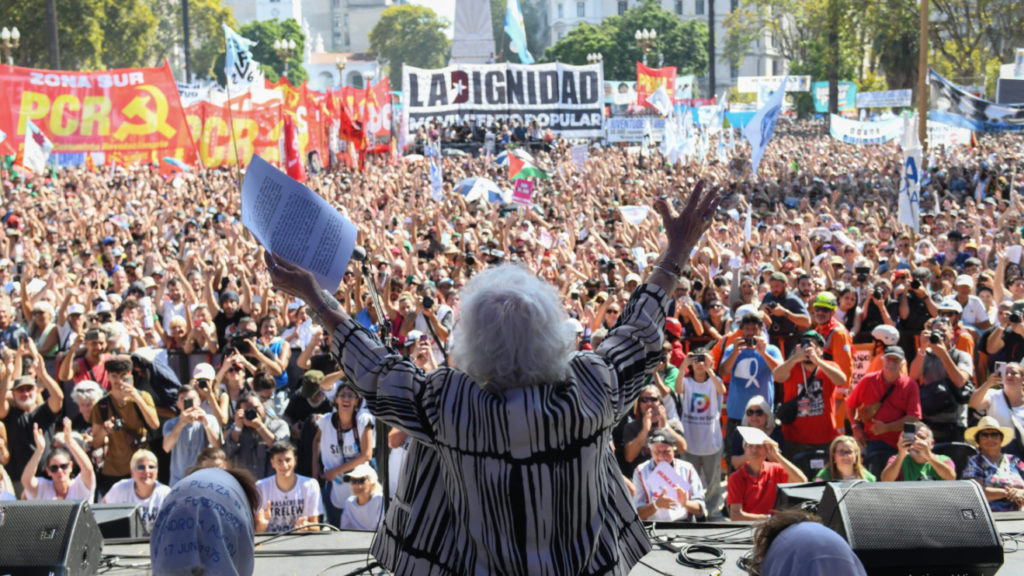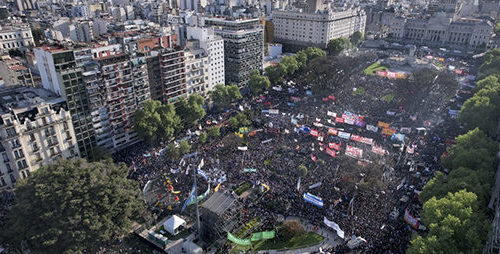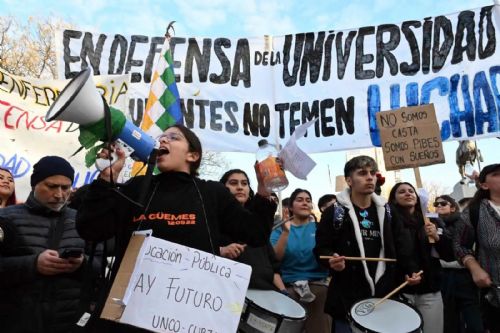In the ranks of the opposition in the Legislative Assembly[1], Milei’s statement caused general repudiation of political leaders, of the Trade Unions of Peronism, and of others standing outside in solidarity with Cristina. Some, like Senator Carlos Linares of the UP[2], call on Congress[3] to instigate a political trial against the president. Because such speeches operate as incitements to social violence. There are antecedents to this, as when particular moods used to be generated in the media by libertarian networks; or as on 2 Sept 2022, when the LLA (Forward Liberty, Milei’s organisation[4]) induced youths’ protests that ended with an attempt on Cristina’s life, then the Vice-President[5]. What is called ‘Justice’ did little to get to the roots or convict the perpetrators of the crime, in a country where the Judicial power stood behind the Executive, without acting independently and without respect for the constitutional norms.
The students’ mobilizations have been exemplary. There have been hundreds of public college occupations across the country. Some faculties held classes and meetings outdoors, in hope of the peaceful resistance that speaks to society and avoids fatal setbacks. Right-wing LLA activists attempted to provoke and infiltrate the students’ assemblies at Quilmes, bringing tear gas with them, finding justifiers in the speeches made by the Security Minister Patricia Bullrich[6]. In spite of these attempts, the youth of the public universities were not intimidated. On Tuesday 22 October, they arranged for hundreds of classes to take place in the open air, on the Plaza de Mayo, to protest the presidential veto against funding by the State. Either to ignore those students, or to provoke them, Milei appeared on the balcony of the Casa Rosada[7] with some government members, to celebrate his birthday, directing his vacant gaze towards the sky. The students interrupted the calm of the public classes and began to protest and shout: “The university belongs to the workers! Those who don’t like it, fuck you!”.
The presidential antics bring upon themselves the derision of many notables; as in the case of the Actor, Director and Producer, Norman Briski[8], who declared during the presentation of the “Martin Fierro Prize for Cinema and the Arts” (which had repercussions for his criticism, among other things, of the massacre in Gaza): “Fiction is a photograph of reality. They buffet us with fiction. Fiction is in the Rosada! » For this oratory, the actor is subject to legal complaint and reviled by democratic bigwigs.
In addition to the Milei’s veto on public universities’ financing, measures grow against the protests of rectors and professors whose salaries have fallen by 45%. Through a legally non-compliant organization (SIGEN), the government has instigated an audit of universities, which the rectors are challenging in court.
Meanwhile, the Public Sector workers have started to strike. They joined the 4th national general strike of the Train, Metro, Taxi, Airplane and Customs workers. Simultaneously, there is to be the strike of the Professors and University Employees, with the backing of the two CTA (Union Federations) in the field of education. The 5th national strike will be when the buses stop in protest at the cuts in their subsidies and the hike in the price of already overpriced tickets for the population. Add to this the synchronized blackout of residents in the face of increasing electricity prices.
Another highlight was the massive demonstration of 50,000 people, humble folk organized by Governor Axel Kicillof (UP)[9] of the province of Buenos Aires in commemoration of October 17, 1945, when people took to the streets to free Perón from prison[10]. With the participation of several mayors and Peronist political leaders & Trade unions (CGT/CTA), Kicillof strongly attacked Milei’s policies, along with the economic regression taking place and that of the social rights. He offered his efforts and the aims of his administration in all the regions of Argentina’s most populous provinces. He recalled how much happier the people of Argentina had been during the Nestor Kirchner government (2003-2007) and Cristina’s which had followed (2007-2015). Kicillof defended her against all the judicial attacks, the one she suffered in 2023 included. This recognised the leading role that she plays, therefore, without engaging with the candidacies[11] that face the Justicialist Party in forthcoming internal elections. Kicillof recommends the unity of Peronism. His speech ended with full support for the students’ struggle in defence of the public university.
Cristina Kirchner has executive presidential experience and she is easily recognised as a leader of the masses. She is the main and most competent candidate to become next president of the Justicialist Party. The election is for 17 November in principle. The internal controversy has to do with candidacies that do not bring clarity to the programmatic differences – these having allowed conservative or centre-right sectors to interfere in the unity of this biggest and historic mass Peronist Party.
An internal controversy is discernible among the leading members, but the reasons for it are not being clarified by Cristina and Axel Kicillof either. They are the two central personalities who remained united throughout all the Kirchnerist presidencies. There has been delay of collective evaluation. There have been delays, and a lack of deep strategic and programmatic assessment about the defeat of the Peronist UP, in front of Milei and his electoral victory. This weighs on the [coming] internal election to decide on the next UP president. The confrontation ends up with personifications and ruptures between ideologically compatible leaders. This creates a harmful disunity in the face of a Milei charging around at 100k/h. Some supporters of the centrality of Cristina consider valid the support that Axel Kicillof offers her. Focused on governance in Buenos Aires and party unity, he is not a candidate in this internal election. The moment demands a united and combative political opposition, in tune with the new student movement, the teachers, the doctors and the retirees in the streets.

Estela de Carlotto[12] is the leader of the “Grandmothers of the Plaza de Mayo”[13]. On the occasion of the 47th anniversary of the Grand-mothers’ organization, she and Tati Almeida[14] – a fighting mother of the “White Handkerchiefs” – stimulated the meeting between Cristina Kirchner and Axel Kicillof. In an article about the significance of this action, the political scientist Luis Bruchtein[15]testified to its “bridge” effect in the Justicialist Party’s internal debate.
It is important to highlight the visits of Cristina to neighbourhoods and to universities like the National Arts. Kicillof visited the Provincial Congress of Integral Sexual Education (ESI) that Milei had castigated during his electoral campaign as a “post-Marxist program “. An example of the UP’s concern to dialogue with the masses was also given by the UP deputy, Leandro Santoro of the National Alphonsinist Movement. The current rupture of the UCR (Radical Civic Union) where 12 deputies left their parliamentary bloc for treason and adherence to Milei, strengthens the centrist positions and the Peronist-Alphonsist parliamentary opposition. In front of the dominant media and its political hegemonic power, legislative opposition will only stand a chance by dialoguing and organising in the bases, the centres of work and of study. This is especially so in our era of the Elon Musk’s social networks, the fake news, the X and the presidential tweets.
Here you see some of the complications in the process in Argentina. After 10 months of the Milei’s government, industrial closures reached 13% and food consumption went down by 22% The libertarian neoliberal project is destroying the public companies through privatizations and the suspension of public works. It closes train stations and State amenities like the AFIP (Federal Public Tax Administration). All this accompanied by staff layoffs, crises in the small and medium-sized businesses, budget cuts in education, culture, health and transport, poverty wages, poverty pensions, incitements to hatred and violence.
This government supports the genocide in Gaza. It is alien to the historic formation of the BRICS. From so many elements of pessimism and political depression, Kirchner’s Peronism needs to emerge rapidly and united.
From our correspondent in Buenos Aires – 29 October 2024
Feature image: the impressive march of October 2, 2024 in Buenos Aires
[1] In Argentina, deputies (MPs) and senators can meet together in Legislative Assemblies.
[2] Carlos Linares, UP – A Senator elected MP (deputy) in the elections of 2020, from the Justicialist Party (UP) which is the Peronist Party.
[3] Congress is the legislative branch of the government of Argentina. It has two parts. There is a 72-seat Senate and a 257-seat Chamber of Deputies.
[4] In the elections of 2023, Javier Milei won the presidency through having become famous on TV shows, hosting a radio show and singing with a rock band. He likes to say that he comes from Liberland, a country between Serbia and Croatia, where people pay no taxes and individual freedom reigns. In September 2024, he launched a new national Party, La Libertad Avanza (LLA), which had been only a coalition up to then.
[5] Wikipedia reports this incident as ‘attempted assassination’: https://en.wikipedia.org/wiki/Attempted_assassination_of_Cristina_Fernández_de_Kirchner
[6] Patricia Bullrich was named Security minister in 2023 by Javier Milei. On 16 Oct 2024, Bullrich accused the students of wanting to destabilise the government. She compared the situation to Chile in 2019 when the students had been (accused of being) violent. Since June 2024, Argentina’s Minister of Defence, Luis Petri, has been representing Argentina in the Ukraine Defence Contact Group, also known as the Ramstein Format, spanning Nato, EU members and others, according to the Ukrinform News Agency. On 18.4.24, president Milei formally requested to join Nato “as a global partner”.
[7] Dominating the Plaza de Mayo, the Casa Rosada – or pink house – is the seat of the Argentine national government, and houses the president’s office.
[8] Norman Briski, is an Argentinian Jewish Actor born 1938. On 29.10.24, he published a video saying: “Norman Briski Stands with Palestine”. He also tells the world that “Gaza will not be defeated!”.
[9] Former President Cristina de Kirchner and Buenos Aires Governor Axel Kicillof made a remarked public appearance at the Grand-mothers of Plaza de Mayo 47th anniversary celebration in La Plata 24.10.24. The UP is the Popular Unity Party – Peronist – formed in 2010. It is a left-wing nationalist party founded by Trade Union leader Victor de Gennaro. It became part of the Frente de Todos, an electoral coalition formed in 2019 to support the presidential candidacy of Alberto Fernandez.
The Abuelas de Plaza de Mayo are the Human Rights group that searches for the children stolen from their parents, particularly from their pregnant mothers, during the Videla dictatorship (1976-83).
Estela de Carlotto
[10] On 1 July 2024, a ceremony took place at the Historical Museum in San Vicente, in tribute to Juan Domingo Peron (1895-1974) on the 50th anniversary of his death. In 1945, vice president and minister of war Juan Peron was arrested by right-wing sectors in the navy who feared his pro-working-class policies. Labour Unions organised strikes and rallies to have him released. On 17 October 1945, 300,000 people took to the streets and got him out of jail. He was taken to the presidential palace from whose balcony he vowed to lead people to victory in forthcoming presidential election. He won the election, improved wages & working conditions, nationalised the public services and won overwhelming support from legions of poor workers (Wikipedia).
[11] On 17 November 2024, the Justicialist Party (Peronist) will hold elections to replace Alberto Fernandez as Party leader. It is said that Alberto was wavering in his position against Milei, and faced pressure to step aside. On the right of the political spectrum, ultra-right former president Mauricio Macri could be heading for the leadership of the PRO (Propuesta Republicana).
[12] Estela de Carlotto: Born 1930. Her daughter Laura was 3 months pregnant when Videla’s soldiers came for her in 1977. After all these years of the disappearance of Laura, Estela met her grandson Guido in 2014. This was made possible by the National Genetic Data Bank towards which Guido had turned, once he had become suspicious of his own origins. Guido had seen Estela on TV and heard her in the media. Estela says: “I hugged him and told him: ‘I have been searching for you for so long’”. Estela adds: “this gives me strength to keep searching for those grandchildren who remain missing”.
[13] Interview with Estela Barnes de Carlotto, International Review of the Red Cross 2017, The Missing. https://international-review.icrc.org/sites/default/files/irrc_99_905_2.pdf
[14] Tati Uranga Almeida never saw her son again. He disappeared on 17 June 1975. Human Rights estimate that more than 30,000 people were kidnapped and murdered during this time by extreme right-wing groups connected with the military government of Videla that seized power in 1976.
[15] Luis Bruschtein, Journalist, Deputy Editor of Pagina 12. He is the son of Laura Bonaparte, one of the founders of the Mothers of Plaza de Mayo. Wikipedia.



















